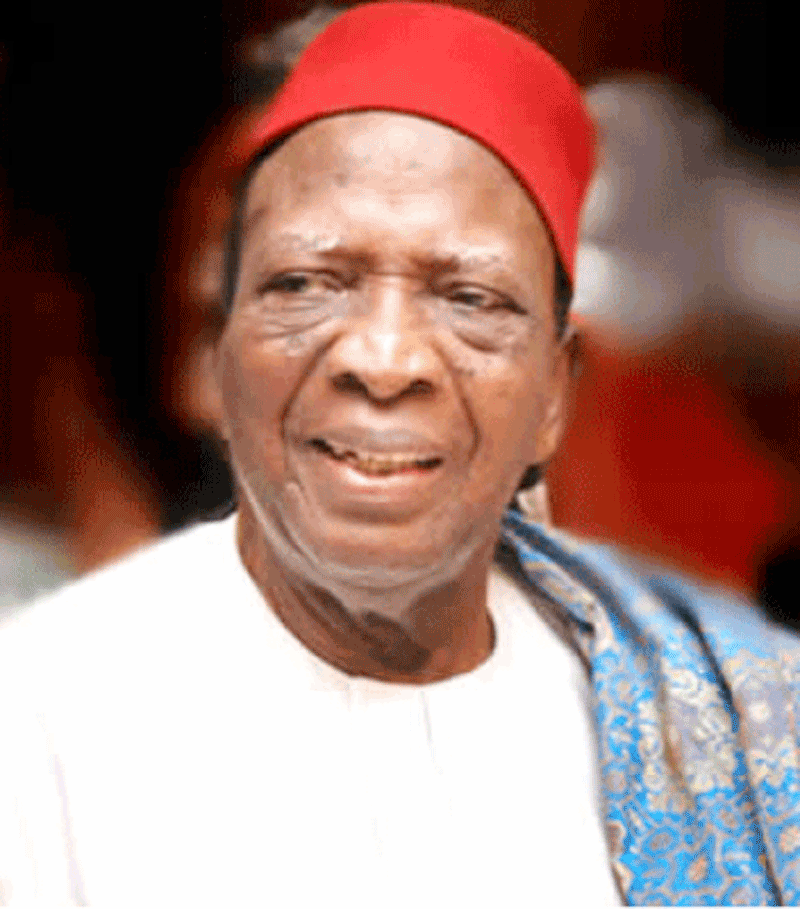Tribute to Prof Nwabueze at 86

On Wednesday, March 22, Professor Benjamin Obiefuna Nwabueze clocked 86. No drums were rolled out, unlike last year when his hometown, Atani, in Anambra State, stood still in celebration.
I wouldn’t even have remembered if not that a team of TheNiche editors paid him a courtesy call on Friday, March 17. Incidentally, one of us, Emeka Duru, shares the same birthday with him.
But there is a huge difference which appositely illustrates the two epochs in which both men were born. While Duru knows the day he was born, Nwabueze’s is a matter of conjecture and he says so in his autobiography, Ben Nwabueze: His Life, Works and Times.
“Atani as an illiterate community at that time meant that there was no written record of my birth. There was no system of registration of births and deaths, and no certificate of either event.
“The recollections of old family members and certain events that occurred around the time were the usual means of ascertaining the dates of births in the village.
“These means indicate 1931 as the year of my birth, but the exact day and month in 1931 remain a matter of conjecture. The conjecture … fixes March as the month of my birth, probably 22nd March.”
The era of his birth essentially defines him though he is today in every sense a renaissance man. So, when he admits being “at bottom, a die-hard traditionalist,” it does not negate that he is perhaps one of the most urbane, suave and gracious Nigerians schooled in all the nuances that define the present time.
Nwabueze explains why and how he is able to straddle both worlds seamlessly.
READ ALSO: How we can achieve the Nigeria Project, by Nwabueze
“People may sometimes wonder how someone schooled in the ways and practices of the learned profession of law, in the ideas and processes of constitutional democracy, and generally in the values and norms of modern life, as I am, has also such strong attachment to African indigenous customs and traditions, as I have.
“The explanation lies partly in the deep respect I have for customs and traditions as an embodiment of the soul of a people, and partly in the fact that as a child growing up in Atani, I was actively involved and participated fully in its traditional and cultural life to such extent that my entire outlook, vision and personality were impregnated by the village’s customs and tradition, to such extent indeed as to make them part of me.”
He would therefore go home every year to celebrate New Yam Festival in style as a titled man.
That is Prof Nwabueze, a man who has spent his 86 years on earth (and still counting) erecting solid foundation for enduring positive change, a man I have the rare privilege of being inducted into his hallowed loop of friendship.
I was told by his Secretary, Damian Obiefule, that the man I revered from a distance fell in love with my column, Candour’s Niche, in the Daily Independent newspaper.
Then, I got a call one day from his chambers for a meeting. He had written another book and wanted me to be part of the public presentation. That is the beginning of what has turned out to be a very robust and rewarding relationship from which I have learnt a great deal.
Prof believes in friendship but at the same time does not suffer fools gladly. He is very principled and value-driven in his engagements.
As a journalist, his intellectualism has enriched my career immensely. He is an interviewer’s delight who does not pull punches no matter whose ox is gored.
He describes himself as a man whose passion is intellectualism and who, in trying to contribute to the advancement of knowledge, has written 34 books, “The last of which is Save Our Constitutional Democracy from Emasculation, which I have autographed for you. I hope you find time to read it.”
An intellectual pugilist, he does not run away from any scholarly fight. He is cerebrally arrogant. And why not? But even in his arrogance, he elevates every discourse with superior argument.
You may not agree with him but you ignore him at your peril.
When he agrees with you, he does not only stop at reading the article and nodding his head, he sends a “thank you letter.” When he disagrees, he does same or writes his own article disagreeing with you.
Then, he started quoting me in his articles. The first time he did, I walked on the moon, literally.
When we were about to set up TheNiche, I hinted him but forgot to alert him when we hit the newsstands. When he eventually saw the newspaper, he was jubilant and quickly sent a mail.
“Dear Ike, what I saw of the publication, TheNiche, was superlative beyond description; it is not of course less than what I had expected. Congratulations!”
And since then he has paid attention, looking out for us.
In celebration of his 85th birthday, he assembled some accomplished scholars to write a book in his honour. And guess what? He invited me to be part of the project.
Again, the ever ubiquitous email.
“Dear Ike, knowing how busy you must be putting materials together for future issues of TheNiche every Sunday, I have some trepidation in requesting you to undertake an assignment involving considerable study, thinking and writing.
“But I do want you to be part of a book project consisting of essays by various contributors, including yourself, with the title, Challenges of Good and Democratic Governance in Nigeria: Essays in honour of Professor Ben Nwabueze.
“The title of the chapter I would like you to write on is The impact of jumbo remunerations for National Assembly members and the high cost of governance generally on good governance in Nigeria.”
For me, it was not a mere request. It was an “order” from the Field Marshal of Intellectualism, master of the written word himself, and who am I to say no. The book has since been completed.
Then came another mail from him last year.
“I seek permission from TheNiche and yourself, as author of the article titled: Time to rethink Nigeria, to publish the article as appendix in my forthcoming book, The National Question & Corruption – With Form of Government as the third agitating issue. I would be pleased to get your approval as quickly as possible.”
That is the relationship I have with the learned professor whose children reverently call “Oduah,” and others “Akunnia.”
At 86, Nwabueze says, “I don’t have any personal regrets. I have achieved all I want to achieve.”
Nobody can dispute that. In 86 years, Nwabueze, as another great Igbo son, Professor MJC Echerou, observes, has been “a junior civil servant, high school teacher, law student and teacher, solicitor and advocate in private practice, minister of education in military administration, legal adviser to a large multinational financial institution, adviser to a United Nations board of labour experts, and co-founder and for nearly three decades secretary general of Ohanaeze, the pan-Igbo cultural organisation.”
Then throw into the mix a haul of over 200 peer-reviewed articles, over 100 conference keynote speeches and 34 books, with the first, The machinery of Justice in Nigeria, published in 1963.
Though Prof Nwabueze has no personal regrets, he is greatly burdened that Nigeria is still crawling at almost 57. His trauma is worsened by his unalloyed patriotism.
“I am disappointed for the nation,” he told TheNiche last week. “The country is not what I had expected it would be or what I thought I would leave behind when the time eventually comes.
“I regret that we don’t seem to have learnt from the point of view of good governance. I don’t think we have learnt what good governance means, what its demands and challenges are.
“Our founding fathers meant well but since that time, leadership has been disappointing, very disappointing.”
But, his disappointment notwithstanding, he says all hope is not lost.
“Hopefully, one day a leader imbued with passion for revolution will emerge, not all these ones shouting ‘change, change’ without even understanding what change means. You can only have change when you have a leader imbued with a passion for change.”
Prof Nwabueze has lived a charmed life. From his humble beginnings, he grew up to become perhaps Nigeria’s most authoritative legal export while at the same time dominating, in significant ways, the domestic legal environment, becoming the most quoted legal authority in Nigeria.
At 86, he will be the first to tell you he is at the departure lounge of life. Because he is humble, he asks that when he goes the way of all mortals, he should be “remembered as a poor village boy born of illiterate parents who knew the value of education … as a true patriot of Nigeria … as a man passionate about knowledge.”
But we all know he will be remembered for much more. Happy birthday Oduah!
















